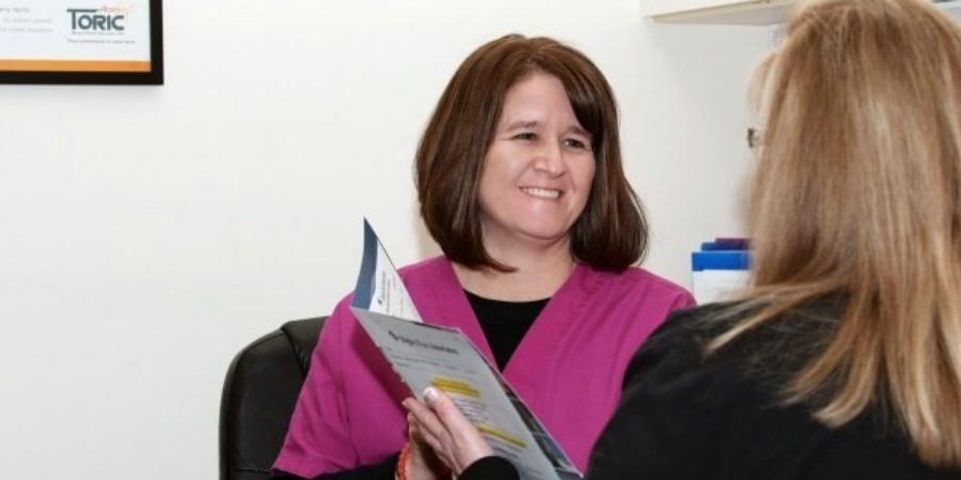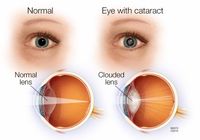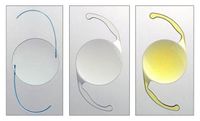
Inside the eye, there is a lens that helps focus light toward the back of the eye onto the retina. The retina then senses the light. A cataract is when the natural clear lens becomes cloudy. Cataracts exist on a spectrum from mild cloudiness of the lens that does not affect the vision to complete cloudiness that makes a person nearly blind.
What Are the Symptoms of Cataracts?
 In the early stages of a cataract, there may be no symptoms at all. As the cataract progresses and gets worse, it can be like looking through a haze or fog. Patients with cataracts often report problems with glare at night or light sensitivity during the day. Some patients may experience double vision from a cataract or dull vision with a less vibrant appearance of colors.
In the early stages of a cataract, there may be no symptoms at all. As the cataract progresses and gets worse, it can be like looking through a haze or fog. Patients with cataracts often report problems with glare at night or light sensitivity during the day. Some patients may experience double vision from a cataract or dull vision with a less vibrant appearance of colors.
What Causes Cataracts?
There are many causes of cataracts, but they most commonly occur as you age. Other causes of cataracts can include trauma to the eye, medications such as long-term steroid use, medical conditions such as diabetes, prior history of eye surgery, and excessive time in the sun — especially without UV protective sunglasses. People rarely can be born with cataracts or develop cataracts early due to their family history of cataracts.
What Is the Treatment for Cataracts?
 It depends on the severity of the cataract. Mild cataracts may just be monitored with routine eye exams. As cataracts progress, they may change your glasses prescription and thus be treated with a new set of glasses. When the cataract progresses to a point where the vision is affected, cataract surgery may be the best treatment. Cataract surgery involves removing the cloudy lens and replacing it with an artificial lens implant.
It depends on the severity of the cataract. Mild cataracts may just be monitored with routine eye exams. As cataracts progress, they may change your glasses prescription and thus be treated with a new set of glasses. When the cataract progresses to a point where the vision is affected, cataract surgery may be the best treatment. Cataract surgery involves removing the cloudy lens and replacing it with an artificial lens implant.
How Do You Know Your Cataracts Are Ready for Removal?
Have your cataracts monitored by an eye doctor regularly, and look out for the typical symptoms of cataracts, such as decreasing vision and worsening glare. Taking note of any symptoms will help your doctor determine the best timing for cataract surgery.
Can Cataracts Harm Your Eyes?
Cataracts are not typically harmful to the long-term health of the eye. For this reason, if the cataract is not affecting a person’s vision, they are typically just monitored with routine exams with an eye doctor. Rarely, cataracts can contribute to glaucoma or inflammation in the eye — called uveitis. In these instances, a doctor may recommend surgery to remove the cataract earlier.
What Can You Do to Prevent Cataracts?
Although there is nothing you can do to completely prevent cataracts, wearing sunglasses that filter out UV light is an important step toward protecting your eyes. This will also limit the cataract progression because of the association between high UV exposure and the development of cataracts.
Although cataracts greatly impact the quality of your vision, you can catch them early with the help of an eye doctor. North Carolina residents in Greensboro and High Point can be proactive about cataract care by making an appointment with Digby Eye Associates. To schedule your Cataract Evaluation exam today, please contact the Greensboro office at 336-230-1010 or High Point office at 336-454-2020.
 Steven J. Glenn, M.D. is a comprehensive ophthalmologist who joined Digby Eye Associates in August 2018. Originally from Utah, he graduated Magna Cum Laude with an undergraduate degree in Physiology and Developmental Biology from Brigham Young University. He received his medical degree from Texas A&M College of Medicine, where he graduated with honors and was elected to the Alpha Omega Alpha honor medical society. He then completed a transitional year internship at Spartanburg Regional Healthcare System in Spartanburg, South Carolina, followed by Ophthalmology residency at the Medical College of Georgia in Augusta, Georgia.
Steven J. Glenn, M.D. is a comprehensive ophthalmologist who joined Digby Eye Associates in August 2018. Originally from Utah, he graduated Magna Cum Laude with an undergraduate degree in Physiology and Developmental Biology from Brigham Young University. He received his medical degree from Texas A&M College of Medicine, where he graduated with honors and was elected to the Alpha Omega Alpha honor medical society. He then completed a transitional year internship at Spartanburg Regional Healthcare System in Spartanburg, South Carolina, followed by Ophthalmology residency at the Medical College of Georgia in Augusta, Georgia.
During his residency, Dr. Glenn served as chief resident and was trained in the latest surgical and medical treatments in ophthalmology, including cataract and refractive surgery, glaucoma, corneal disease, oculoplastics, retinal disease, and neuro-ophthalmology. He is an active member of the American Academy of Ophthalmology® and the American Society of Cataract and Refractive Surgery®.
He lives in Greensboro, NC, with his wife Megan, who is a licensed social worker. They have a beautiful baby boy born in October 2018! In his free time, he enjoys cooking, spending time outdoors, photography, and skiing.
About the Business
Have a question? Ask the experts!
Send your question

